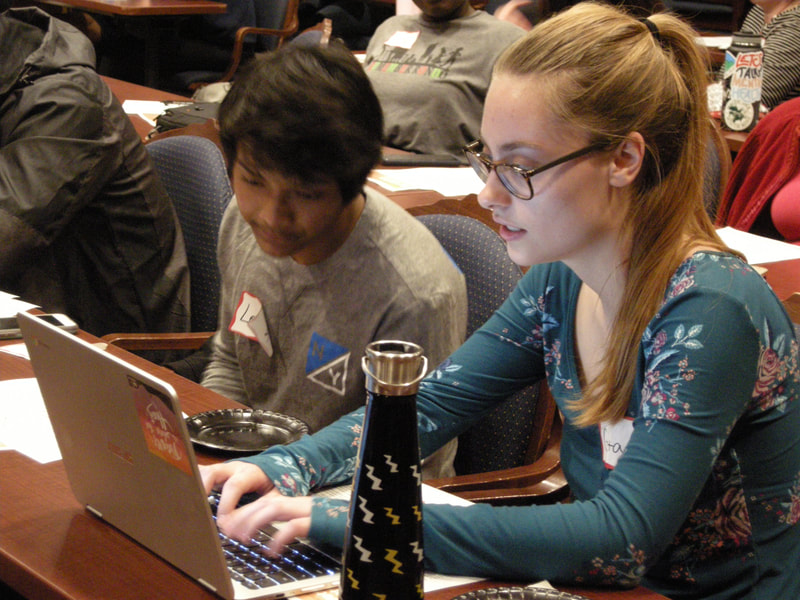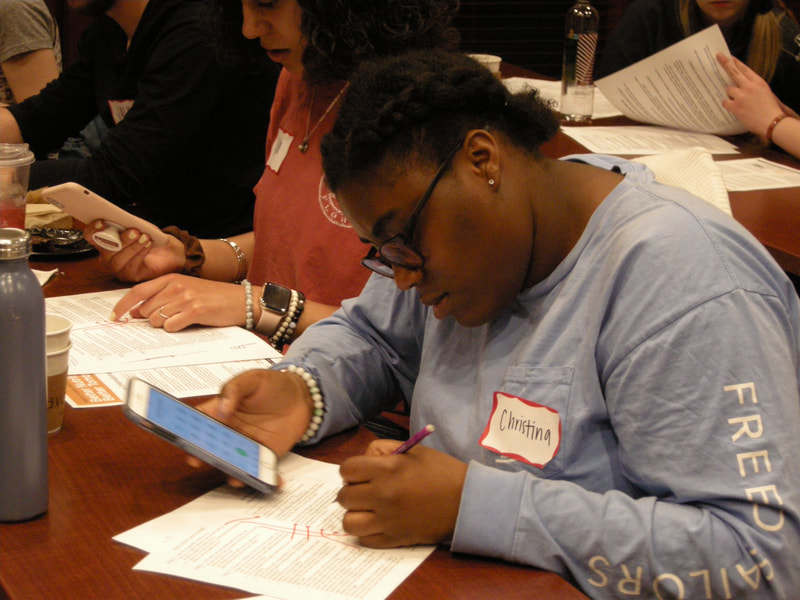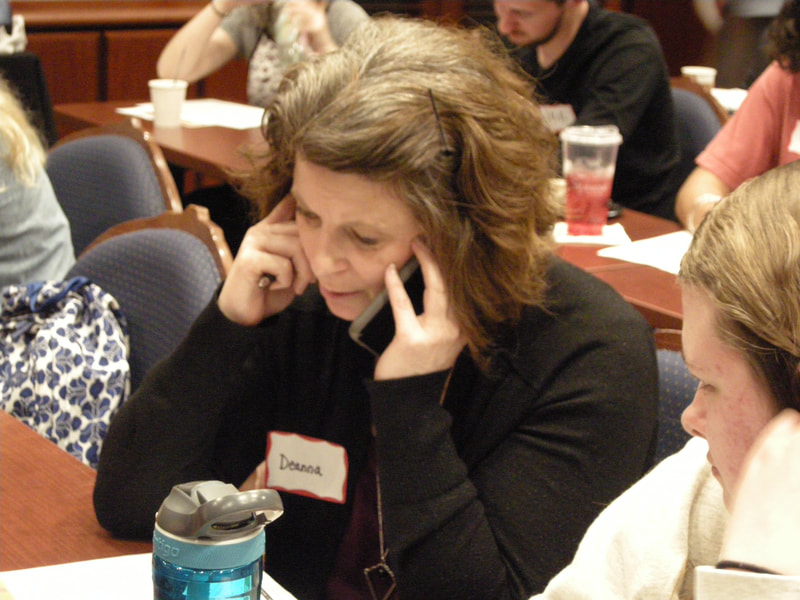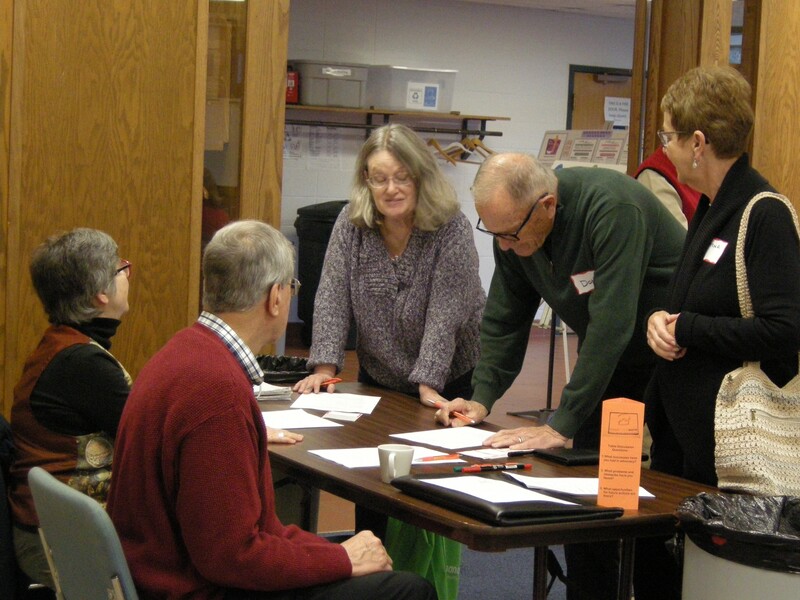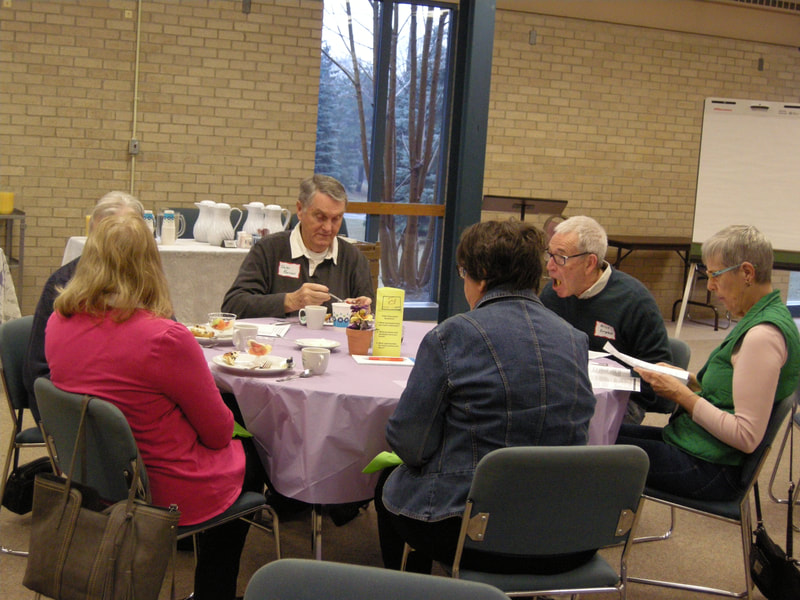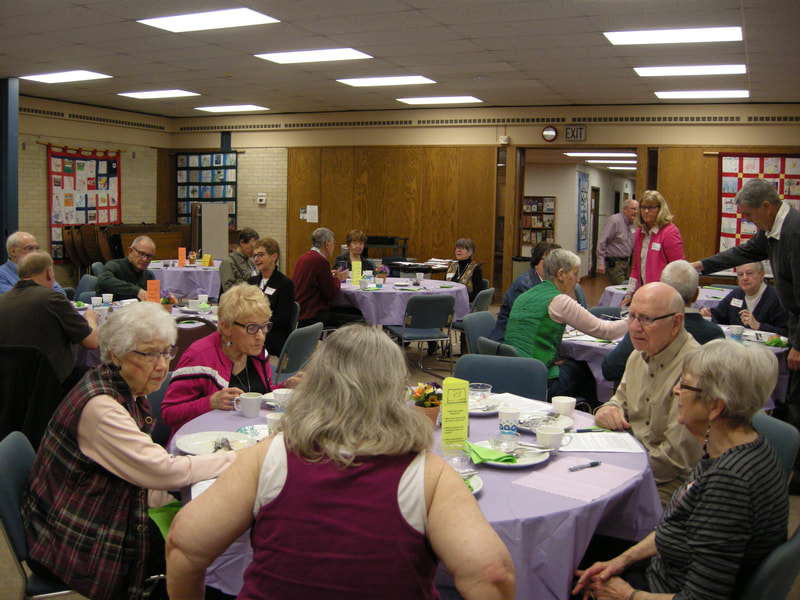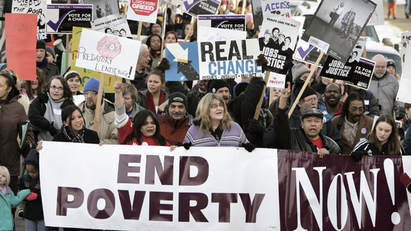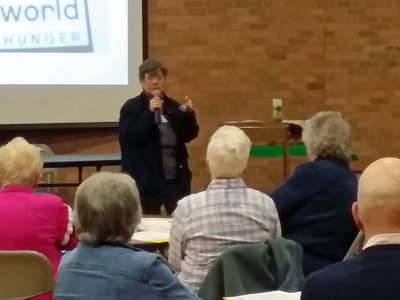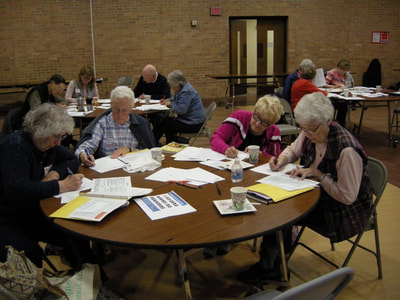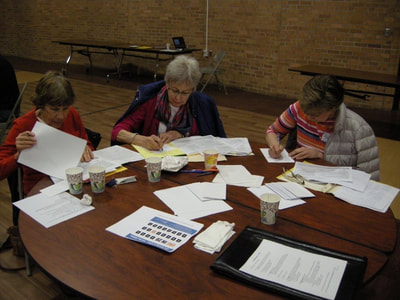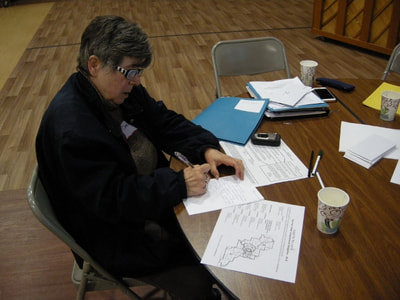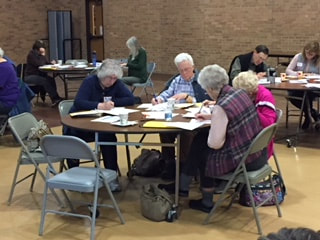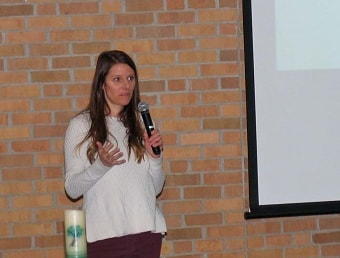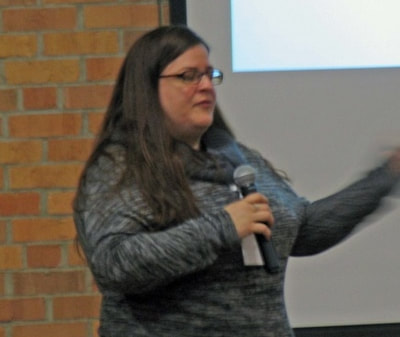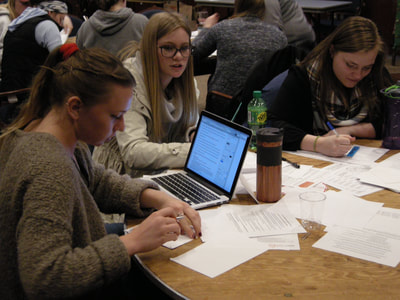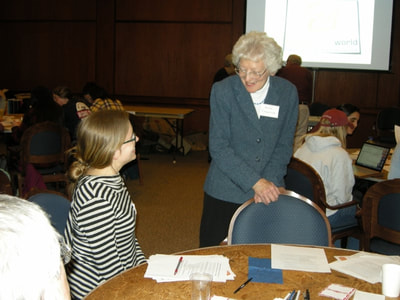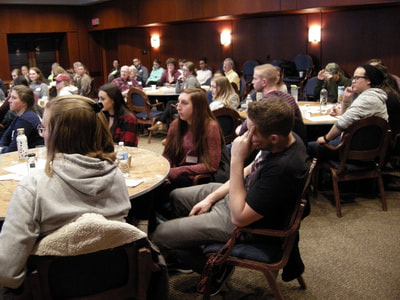Who We Are
The Twin Cities' Metro Area Team is a part of Bread for the World, a collective Christian voice urging our nation's decision makers to end hunger at home and abroad.
We write to Congress to advocate for social justice to eliminate hunger and poverty.
**************************************
We write to Congress to advocate for social justice to eliminate hunger and poverty.
**************************************
BREAD FOR THE WORLD WORKSHOP
BETHEL UNIVERSITY
March 27, 2019
BETHEL UNIVERSITY
March 27, 2019
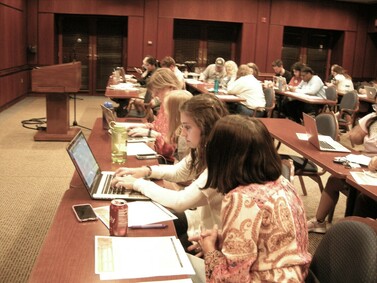
The workshop opened with a welcome from the Bethel Social Justice class professor, Eydie Shypulski. She spoke about the importance of advocacy.
Dottie Fergus shared what Bread For the World does in advocacy on a national basis by grassroots people. Over 40 years BFW has spoken up on federal government issues. How does BFW work? Our letters, emails, and phone calls matter. Congress wants to know what constituents think. She explained how to join BFW.
Ed Nieman had devotions consisting of a litany from the Bread For the World book Banquet of Praise.
Marty Fergus spoke on Policy, especially Global Maternal and Child Nutrition. He explained that foreign aid is less than 1% of the federal budget. The U.S. gives more than any country. Women are 40% of the agricultural workforce of the world. He gave an overview of the U.S. foreign aid program. He referred students to the sheet of Facts on International Hunger and Poverty. Then he explained Feed the Future, Food for Peace and the Emergency Food Security Program, the McGovern-Dole International Food for Education, PEPFAR, and Millennium Challenge Account.
Donna Neste explained how to make phone calls to your members of Congress. She demonstrated this by making a phone call a call to Amy Klobuchar’s office that everyone could listen to on speaker phone. A student then made another call, this time to Tina Smith’s office, also on speaker phone. All the students in class were then invited to make phone calls of their own, and a number of students did so. Eydie Shypulski emphasized that no one need follow a suggested “script.” Each person should “speak from the heart” and that it is important to be “persistent” in doing this work.
Marty gave out information on how to contact Representatives or Senators by email. Students were then given time to send emails of their own and a number of students did so. One student shared a reply she got from her email.
Marty distributed a sheet on how to conduct office visits to a Member of Congress.
Evaluations were handed out and Edward Nieman closed with a prayer from the BFW book Banquet of Praise.
Submitted by Edward Nieman, Bread For the World Metro Committee member from the 6th congressional district [with a few tweaks from Marty Fergus].
Dottie Fergus shared what Bread For the World does in advocacy on a national basis by grassroots people. Over 40 years BFW has spoken up on federal government issues. How does BFW work? Our letters, emails, and phone calls matter. Congress wants to know what constituents think. She explained how to join BFW.
Ed Nieman had devotions consisting of a litany from the Bread For the World book Banquet of Praise.
Marty Fergus spoke on Policy, especially Global Maternal and Child Nutrition. He explained that foreign aid is less than 1% of the federal budget. The U.S. gives more than any country. Women are 40% of the agricultural workforce of the world. He gave an overview of the U.S. foreign aid program. He referred students to the sheet of Facts on International Hunger and Poverty. Then he explained Feed the Future, Food for Peace and the Emergency Food Security Program, the McGovern-Dole International Food for Education, PEPFAR, and Millennium Challenge Account.
Donna Neste explained how to make phone calls to your members of Congress. She demonstrated this by making a phone call a call to Amy Klobuchar’s office that everyone could listen to on speaker phone. A student then made another call, this time to Tina Smith’s office, also on speaker phone. All the students in class were then invited to make phone calls of their own, and a number of students did so. Eydie Shypulski emphasized that no one need follow a suggested “script.” Each person should “speak from the heart” and that it is important to be “persistent” in doing this work.
Marty gave out information on how to contact Representatives or Senators by email. Students were then given time to send emails of their own and a number of students did so. One student shared a reply she got from her email.
Marty distributed a sheet on how to conduct office visits to a Member of Congress.
Evaluations were handed out and Edward Nieman closed with a prayer from the BFW book Banquet of Praise.
Submitted by Edward Nieman, Bread For the World Metro Committee member from the 6th congressional district [with a few tweaks from Marty Fergus].
***********************************************************************************************
COME HUNGRY, LEAVE NOURISHED – BRING A FRIEND!
BREAD FOR THE WORLD METRO TEAM BREAKFAST
APRIL 6, 2019
BREAD FOR THE WORLD METRO TEAM BREAKFAST
APRIL 6, 2019
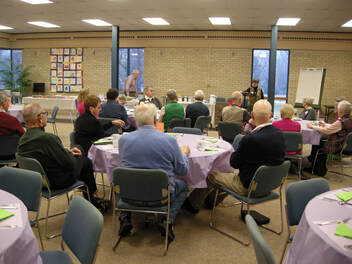
The Breakfast opened with Donna laying out the agenda for the morning: This will not be our typical “Offering of Letters Workshop.” Instead it will be a time to say thank you for all you have accomplished by advocating for people who are poor and hungry, in this nation and abroad. It will also be a Celebration and a Look to the Future.
The first task of the morning was to enjoy breakfast (a choice among Dottie’s five delicious egg dishes, each from a different ethnic background, as well as many side dishes and plenty of coffee). During breakfast the task was first to get to know each other and then to address three specific questions: What successes have you had in advocacy? What problems and obstacles have you faced? What opportunities for future actions are there?
After a leisurely 40 minute breakfast the rapporteur at each table shared the responses from their table to the three questions. This information was recorded on a flip chart (and later emailed to all participants). Marty then outlined a new approach to advocacy used by Bread groups in other areas of the country, namely coordinating the OL campaigns of several congregations, pooling their letters, and delivering them en masse on a visit to the local member of Congress to whom the letters were addressed. A survey was taken to see if churches of any of this morning attendees would be interested in pursuing a similar strategy.
Donna then gave a legislative update on what was happening in Washington, D.C. that would impact Bread’s agenda, along with an outline of the issues encompassed by this year’s Offering of Letters.
Marty then enumerated the various materials available on the display table, including a handout developed by the Twin Cities Metro Team with a number of advocacy tips, entitled You Asked for Something New – We Hope You Find It Here (now available on the breadmn.org website).
All in attendance then shared final thoughts and Ed Nieman concluded the breakfast with a closing prayer from the Bread for the World book Banquet of Praise. It is safe to say that many people left the breakfast equipped and inspired for the work ahead.
Submitted by Marty Fergus, Bread For the World Metro Committee member from the 5th congressional district.
The first task of the morning was to enjoy breakfast (a choice among Dottie’s five delicious egg dishes, each from a different ethnic background, as well as many side dishes and plenty of coffee). During breakfast the task was first to get to know each other and then to address three specific questions: What successes have you had in advocacy? What problems and obstacles have you faced? What opportunities for future actions are there?
After a leisurely 40 minute breakfast the rapporteur at each table shared the responses from their table to the three questions. This information was recorded on a flip chart (and later emailed to all participants). Marty then outlined a new approach to advocacy used by Bread groups in other areas of the country, namely coordinating the OL campaigns of several congregations, pooling their letters, and delivering them en masse on a visit to the local member of Congress to whom the letters were addressed. A survey was taken to see if churches of any of this morning attendees would be interested in pursuing a similar strategy.
Donna then gave a legislative update on what was happening in Washington, D.C. that would impact Bread’s agenda, along with an outline of the issues encompassed by this year’s Offering of Letters.
Marty then enumerated the various materials available on the display table, including a handout developed by the Twin Cities Metro Team with a number of advocacy tips, entitled You Asked for Something New – We Hope You Find It Here (now available on the breadmn.org website).
All in attendance then shared final thoughts and Ed Nieman concluded the breakfast with a closing prayer from the Bread for the World book Banquet of Praise. It is safe to say that many people left the breakfast equipped and inspired for the work ahead.
Submitted by Marty Fergus, Bread For the World Metro Committee member from the 5th congressional district.
***********************************************************************************************
No Poverty! No Hunger! No Excuses!
Our 2018 Workshops are here.

Workshop Outline
The Stories
brought to us by recipients &/or social workers
The Policies which help those in need
Our Empowerment and our calling
"Woe to those who make unjust laws, to those who issue oppressive decrees, to deprive the poor of their rights and withhold justice from the oppressed of my people,” Isaiah 10:1-2 (NIV)
The Bible outlines measures for our nation’s leaders to provide for the most vulnerable members of the community to feed themselves. The choices made by our elected leaders on the federal budget determine how our nation generates revenue. We show our commitment to the common good when we advocate for investments in programs that move people out of hunger and poverty, and into better opportunities in life. Most of the U.S. aid which goes overseas to help those in need comes from our laws and about 95% of our aid to help our own citizens who are poor comes from our laws. Yet only about one-half of one percent of our nation’s budget goes to overseas aid and about two percent of the budget goes to help our citizens. It is our calling to protect the poor by increasing the benefits of the laws governing our social programs.
YOU can write a letter to Congress
in just 2 minutes! Click HERE for the sample US Poverty letter.
Simply choose one or two key points Click HERE for the sample World Poverty letter.
to put in your letter.
Join us as we advocate for those in poverty.
*********************************************
The Stories
brought to us by recipients &/or social workers
The Policies which help those in need
Our Empowerment and our calling
"Woe to those who make unjust laws, to those who issue oppressive decrees, to deprive the poor of their rights and withhold justice from the oppressed of my people,” Isaiah 10:1-2 (NIV)
The Bible outlines measures for our nation’s leaders to provide for the most vulnerable members of the community to feed themselves. The choices made by our elected leaders on the federal budget determine how our nation generates revenue. We show our commitment to the common good when we advocate for investments in programs that move people out of hunger and poverty, and into better opportunities in life. Most of the U.S. aid which goes overseas to help those in need comes from our laws and about 95% of our aid to help our own citizens who are poor comes from our laws. Yet only about one-half of one percent of our nation’s budget goes to overseas aid and about two percent of the budget goes to help our citizens. It is our calling to protect the poor by increasing the benefits of the laws governing our social programs.
YOU can write a letter to Congress
in just 2 minutes! Click HERE for the sample US Poverty letter.
Simply choose one or two key points Click HERE for the sample World Poverty letter.
to put in your letter.
Join us as we advocate for those in poverty.
*********************************************
Report on Bread for the World Workshop at St Stephen Lutheran on April 21, 2018
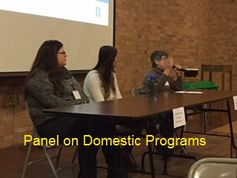
Donna Neste welcomed thirty of us and stated why we are here. She said, “Love is shown in action.” God has given us responsibility to share what God gives.
Karen Fitzpatrick led in worship with prayer, scripture, and the hymn Be Thou My Vision. It was stated we are concerned about food security, enough food for our family. Our theme of the day was we are called and empowered by God to do this work.
Marty Fergus gave an overview of Bread For the World. He began with the 20 bag demonstration. 19 bags show government programs and one bag shows charity value.
A panel of Hennepin County Social Workers MiKayla Handley and Jen Christensen along with Donna Neste shared domestic program stories. Donna told of being on SNAP and WIC during a recession. It was her family’s means of getting good food. When she got a job, it became a hassle to get food with WIC vouchers and she stopped using it. Her son used SNAP and WIC during a sort time while he was a student, his wife did not have a job, and they had three children. It is a myth that families stay on it for generations.
Jen Christensen said families are on it only a short time. At minimum wage families have a hard time making ends meet, paying rent, food, etc. For every $1 spent $3 to $7 is saved in later medical costs. One of every 2 babies is on WIC. She shared slides on WIC and SNAP.
Mikala Handley shared her story of being on SNAP and WIC and explained SNAP. Needed, necessary, and temporary are the key things to these programs.
Our attention was shifted to policies on which we focus for letter writing. Marty brought our attention to a hand out “Facts on Hunger and Poverty in the United States” and “Facts on International Hunger and Poverty”.
Dotty Fergus talked more about SNAP and the EBT card used to get food. She mentioned that WIC lowers the rate of health insurance.
Carol Dubay explained that EITC, Earned Income Tax Credit, is helpful in reducing poverty. The Child Tax Credit also helps eliminate poverty.
Marty explained the foreign assistance programs on the handout. He went into detail about the following paragraph from the hand out. “U.S. foreign assistance saves millions of lives every year. Some key federal hunger-related programs are Feed the Future (strengthening food security), Food for Peace (emergency and recovery food assistance), the McGovern-Dole International Food for Education (school meals), PEPFAR (prevention and treatment of HIV/AIDS), and the Millennium Challenge Account (poverty reduction).” This last program goes to those countries most in need.
Edward Nieman introduced the empowerment section of our day. He reminded us we are called and empowered by God to do this work. We are empowered by learning specific techniques for doing this work. There are many ways to contact our congress men and women. There is Twitter, phone calls, emails, office visits, letters to the editor, and personal letters by snail mail.
Donna gave us a demonstration of a phone call by calling Amy Klobuchar and leaving a message. Marty explained about emails and pointed out that personalizing them makes an impact. He explained office visits and pointed out that there is a hand out that gives details for an office visit. Carol spoke of letters to the editor. The editorial section of newspapers contain guideline for these letters.
Ed Payne reminded us that government spending on these domestic and foreign hunger programs is less than 3% of the federal budget. The foreign portion is 1/2 of a percent of the budget.
We then took time to write a personal letter to our own congress person. The letters were brought to the front of the room and placed in a basket. Ed and Karen led in a closing prayer service for the letters.
*******************************************
Report on Bread for the World Workshop at Bethel University on March 21, 2018
The workshop opened with a welcome from the Bethel Social Work class teacher Eydie Shypulski. She stated that as people of faith it is our responsibility to work for justice. Karen Fitzpatrick, a member of the Bread for the World (BFW) Metro Area Committee, offered a prayer and scripture from 2 Timothy 1. She shared the theme of this workshop: We are called and empowered by God to do this work.
Marty Fergus explained the need for advocacy done by individuals and BFW by having students put grocery bags on tables to represent federal programs versus local food charities. It is a 19 to one ratio. Thus it is extremely important to keep federal programs going to help the poor.
Karen introduced a panel: Helen, the student resource person for the Century College food shelf for students; Anna, a Central College student; and Donna Neste, a former recipient of SNAP and WIC. Anna has a friend who uses the food pantry at Century College. The students can get food twice a month at the food shelf and they are informed about SNAP. There are 350-400 students who use the food shelf monthly. Donna told her story about being a recipient of SNAP and WIC when she was first married in the 1980s, her husband lost his job and she was pregnant. They stopped using it when she got a good job and her husband got a minimum wage job. Her son and his family used SNAP and WIC for a short time when he quit his job to go to school. They were on it only a short time, also. It is a myth that families will stay on SNAP for generation after generation. For her and her family they quit when it became too much hassle and they could support themselves.
Dottie Fergus explained the domestic government programs - SNAP (the Supplemental Nutrition Assistance Program; formerly Food Stamps); WIC (the Special Supplemental Nutrition Program for Women, Infants, and Children); EITC (the Earned Income Tax Credit); and CTC (the Child Tax Credit). A “Facts On Hunger And Poverty In The United States” sheet was passed out. It is available from Bread.org here.
After a break Edward Nieman introduced advocacy and reminded us that we are called and empowered by God to do this work. We can advocate on policies by contacting our congress men or women through email, tweeting, phone calls, office visits, or letter writing. Marty explained the websites for advocacy. He also stated personal letters are most important.
Donna made a call to congress and left a message. Then two students made a call and also left a message.
Karen introduced the offering of letters. She stated the target is to end hunger by 2030. Several students wrote letters. The letters were gathered in a basket and Karen closed by praying over the basket of letters.
**************************************
Marty Fergus explained the need for advocacy done by individuals and BFW by having students put grocery bags on tables to represent federal programs versus local food charities. It is a 19 to one ratio. Thus it is extremely important to keep federal programs going to help the poor.
Karen introduced a panel: Helen, the student resource person for the Century College food shelf for students; Anna, a Central College student; and Donna Neste, a former recipient of SNAP and WIC. Anna has a friend who uses the food pantry at Century College. The students can get food twice a month at the food shelf and they are informed about SNAP. There are 350-400 students who use the food shelf monthly. Donna told her story about being a recipient of SNAP and WIC when she was first married in the 1980s, her husband lost his job and she was pregnant. They stopped using it when she got a good job and her husband got a minimum wage job. Her son and his family used SNAP and WIC for a short time when he quit his job to go to school. They were on it only a short time, also. It is a myth that families will stay on SNAP for generation after generation. For her and her family they quit when it became too much hassle and they could support themselves.
Dottie Fergus explained the domestic government programs - SNAP (the Supplemental Nutrition Assistance Program; formerly Food Stamps); WIC (the Special Supplemental Nutrition Program for Women, Infants, and Children); EITC (the Earned Income Tax Credit); and CTC (the Child Tax Credit). A “Facts On Hunger And Poverty In The United States” sheet was passed out. It is available from Bread.org here.
After a break Edward Nieman introduced advocacy and reminded us that we are called and empowered by God to do this work. We can advocate on policies by contacting our congress men or women through email, tweeting, phone calls, office visits, or letter writing. Marty explained the websites for advocacy. He also stated personal letters are most important.
Donna made a call to congress and left a message. Then two students made a call and also left a message.
Karen introduced the offering of letters. She stated the target is to end hunger by 2030. Several students wrote letters. The letters were gathered in a basket and Karen closed by praying over the basket of letters.
**************************************
